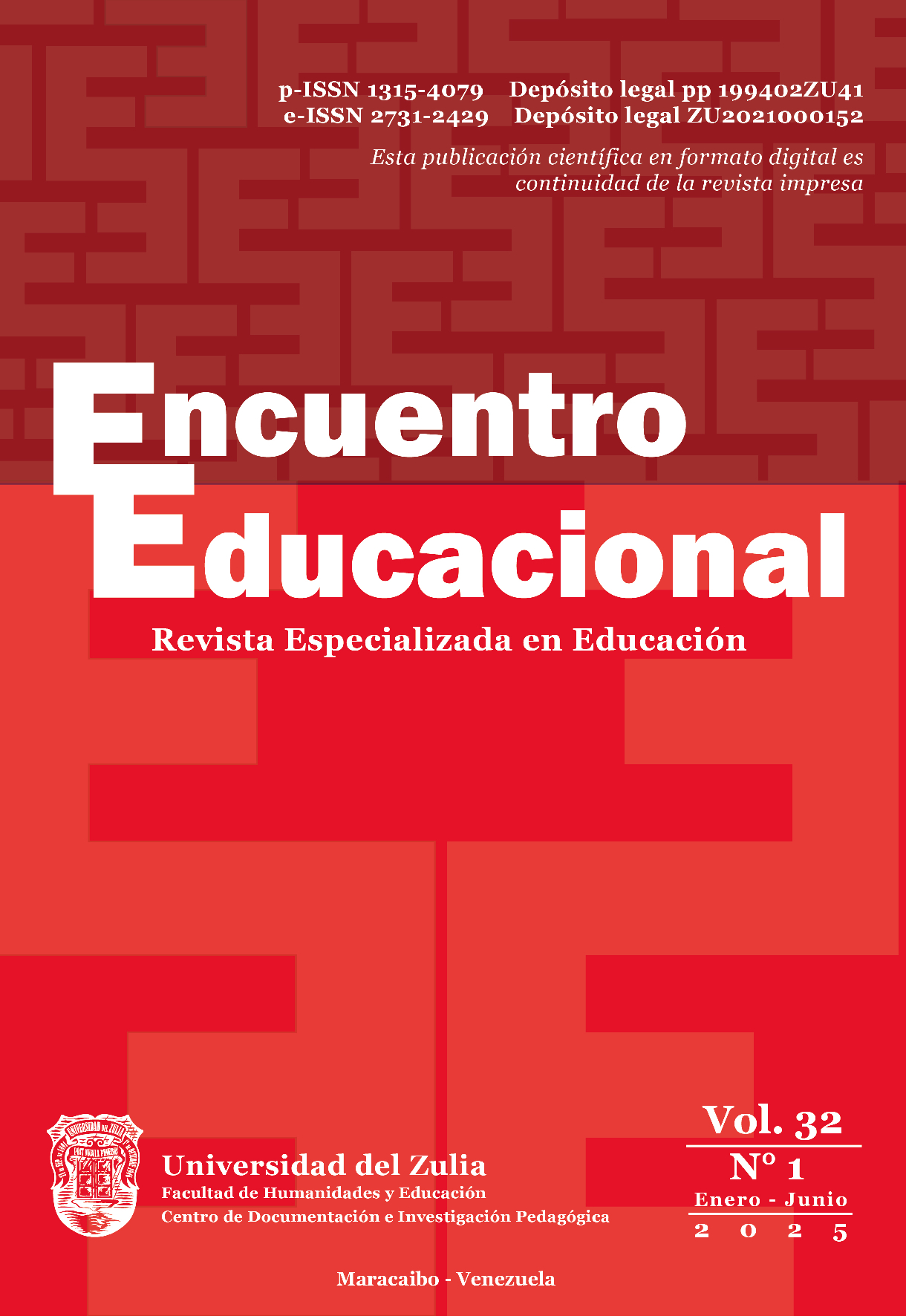Enseñar Geografía desde las Tecnologías de la Información y la Comunicación
Teaching Geography through Information and Communication Technologies
Abstract
The integration of Information and Communication Technologies has transformed learning environments, offering tools to simulate innovative educational experiences. This research aims to determine the information and communication technologies used by teachers for the teaching of Geography in General Secondary Education. The applied methodology had a qualitative approach, with a descriptive scope, field, under a non-experimental, cross-sectional design, developed in a population made up of thirty (30) teachers of the Geography area of General Secondary Education belonging to the Olegario Villalobos Parish of the Maracaibo Municipality, Zulia State, during the 2022-2023 academic period. Data collection was carried out through a checklist made up of 15 items where the plans prepared by them were reviewed. For data analysis, frequency distribution tables were applied. Once the results are analyzed, the deficiencies that Geography teachers have in developing plans that incorporate technological tools in the development of content and the resistance to update and modernize their educational practice are evident.
Downloads
References
Chancusig, J., Flores, Galo, A., Venegas, G., Cadena, J., Guaypatin, O., & Izurieta, E. (2017). Utilización de recursos didácticos interactivos a través de las TIC´S en el proceso de enseñanza aprendizaje en el área de matemática. Boletín Redipe, 6(4), 112-134. https://revista.redipe.org/index.php/1/article/view/229
Díaz, M., & Svetlichich, M. (2016). Nuevas herramientas tecnológicas en la educación superior. Proyecciones, (11), 93-149. https://revistas.unlp.edu.ar/proyecciones/article/view/6485/
Espinoza Freire, E., & Calva Nagua, D. (2022). Las TIC y la enseñanza-aprendizaje de la geografía. Revista Metropolitana de Ciencias Aplicadas, 5(2), 37-44. https://remca.umet.edu.ec/index.php/REMCA/article/view/375
Hernández-Sampieri, R., & Mendoza, C. (2018). Metodología de la investigación. Las rutas cuantitativa, cualitativa y mixta. McGraw Hill.
Macías Álvarez, D. (2010). Plataformas de enseñanza virtual libres y sus características de extensión: Desarrollo de un bloque para la gestión de tutorías en Moodle [Trabajo de pregrado, Universidad de Alcalá]. http://biblioteca.udgvirtual.udg.mx/jspui/bitstream/123456789/2671/1/Plataformas%20de%20ense%C3%B1anza%20virtual%20libres.pdf
Peralta, D., & Guamán, V. (2020). Metodologías activas para la enseñanza y aprendizaje de los estudios sociales. Sociedad & Tecnología, 3(2), 2-10. http://institutojubones.edu.ec/ojs/index.php/societec/article/view/62/414
Pérez, I., & García, A. (2001). Nuevas estrategias de enseñanza en entornos digitales para la enseñanza superior. En Salinas, J., & Batista, A. (Coord.). Didáctica y Tecnología Educativa para una Universidad en el Mundo Digital. Universidad de Panamá.
Rekalde, I., Vizcarra, M., & Macazaga, A. (2014). La observación como estrategia de investigación para construir contextos de aprendizaje y fomentar procesos participativos. Educación XX1, 17(1), 201-220. https://revistas.uned.es/index.php/educacionXX1/article/view/10711
Rodríguez, E. (2006). Enseñar geografía para los nuevos tiempos. Paradigma, 27(2), 73-92. http://historico.upel.edu.ve:81/revistas/index.php/paradigma/article/view/3764
Romero, T. (2006). Moodle, Unimos Mentes, Creamos Conocimiento Libre. Ponencia presentada al VI Congreso Internacional Virtual de Educación CIVE. La Palma.
Riveros, V., Arrieta, X., & Bejas, M. (2011). Las Tecnologías de la Información y la Comunicación en el quehacer educativo del aula de clase. Omnia, 17(1), 34-51. https://produccioncientificaluz.org/index.php/omnia/article/view/7343
Santiago Rivera, J. A. (2005). La situación de la enseñanza de la geografía en Venezuela, desde su práctica escolar cotidiana. Geoenseñanza, 10(2), 163-172. https://www.redalyc.org/pdf/360/36010203.pdf


















